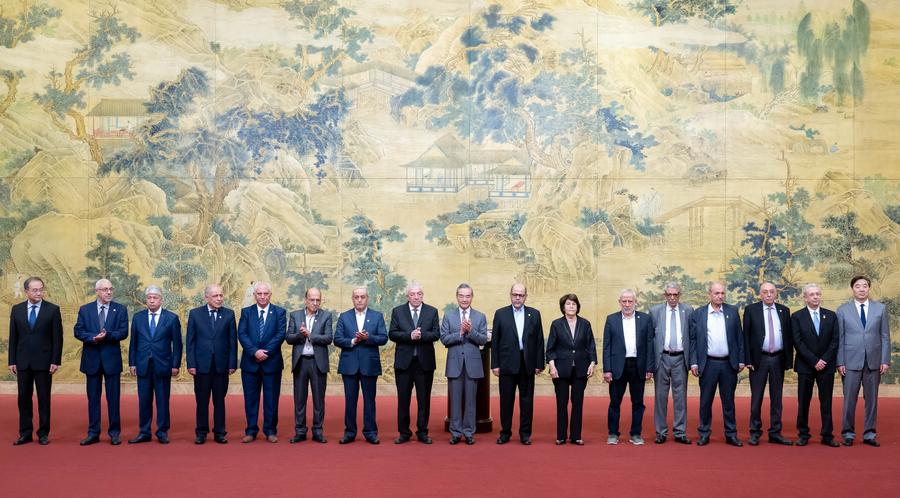
Beijing-mediated reconciliation will help advance the cause of statehood for besieged people amid Israel conflict, Indonesian experts tell a virtual forum.
China has more leverage now to advance efforts to resolve the Israeli-Palestinian conflict following Beijing’s successful mediation of unity and reconciliation pledges among various Palestinian factions, according to the experts.
The Beijing Declaration, signed by Palestinian groups on July 23 following talks in the Chinese capital, demonstrates China’s strong diplomacy capability and marks a decisive step towards a “Free Palestine” and for the future of Palestinians, participants said at the forum organized by the Geostrategy Study Club, which is based in Bandung in Indonesia.
READ MORE: Palestinian factions sign unity declaration in Beijing
Analysts said in the virtual forum that China has played a significant role in solving conflicts in the Middle East by consistently upholding its foreign policy principles that flow from its long-cherished Confucianism traditions of loving neighbors.
Dina Yulianti Sulaeman, director of the Indonesia Center for Middle East Studies and chairwoman of the experts’ council of the Free Palestine Network, noted that the reconciliatory meeting in Beijing was the first time that representatives of 14 Palestinian groups came together and talked with each other.
China had facilitated the dialogue aimed at ending division and strengthening Palestinian unity. Representatives from Egypt, Algiers, Saudi Arabia, Qatar, Jordan, Syria, Lebanon, Iran, Türkiye and Russia also attended the meeting.
Dina said participants in the Beijing meeting comprised of those who insisted on armed struggle and others who preferred negotiation towards an independent Palestine statehood. The first group included Fatah and its rival Hamas, the military wing of the Palestinian nationalist organization that governs parts of the Israeli-occupied Gaza Strip.
The Beijing Declaration includes the affirmation of the Palestinian Liberation Organization (PLO) as the sole legitimate representative of the Palestinian people and the formation of an interim government that would focus on post-conflict reconstruction in Gaza. The declaration stresses the need to hold, under the auspices of the UN, an international conference with a full mandate and broad-based participation from the region and beyond.
Chinese Foreign Minister Wang Yi said that China’s approach to the Palestinian question is guided by principles of fairness and justice, without pursuing selfish interest.
The experts said that over the past decades China had upheld the Five Principles of Peaceful Coexistence that guide its international relations. The principles were jointly initiated by China, India and Myanmar in 1954 and were adopted at the historic Bandung Conference of Asia-Africa in 1955. Those principles are: mutual respect for sovereignty and territorial integrity, mutual non-aggression, mutual non-interference in each other's internal affairs, equality and mutual benefit, and peaceful coexistence.
Ahmad Syaifuddin Zuhri, director of Sino-Nusantara Institute, said the Beijing Declaration had taken many Indonesians by surprise as they were unsure about China’s global power capacity and its experience in bridging Middle East conflicts. He said most Indonesians are not aware that China had brokered peace talks between Saudi Arabia and Iran last year.
Saudi Arabia and Iran agreed in 2023 to restore diplomatic ties after seven years of tension. The agreement was struck in Beijing.
Not many people in Indonesia know about China’s foreign policies, Ahmad said. “Its diplomacy doctrine is known as ‘good neighborhood’ diplomacy.”
“It is like when we walk, our first step decides our next steps,” he said, suggesting that last week’s meeting in Beijing could be the first step towards advancing a settlement that could bring lasting peace between Palestine and Israel.
Ahmad said China is now an economic superpower and many countries, notably developing nations, want to cooperate with Beijing. This would fortify China’s diplomacy power, he said.
He noted that countries rebuilding from conflicts are keen to cooperate with China. Ahmad cited Afghanistan, which received emergency economic assistance from China after the US and its coalition partners withdrew their troops from the conflict-torn country. Afghanistan now exports commodities to China and is expecting investment flow from China.
READ MORE: China aspires to become a superpower of global peace
Ahmad said Israel, which had already developed very close cooperation with China including in the fields of technology and agriculture, is currently suffering a serious economic downturn due to the conflict with Palestine. To get its economy back on track, Israel will need stronger cooperation with China, he said.
Furqan AMC, secretary general of Free Palestine Network, said many people are not aware of China’s geopolitical positions because of the anti-China propaganda spread by US.
Some of the anti-China sentiment has a “very racist flavor”, Furqan said. He added that the mainstream international media continues to negatively frame people’s image of China.
The writer is a freelance journalist for China Daily. Prime Sarmiento in Hong Kong contributed to this story.
Contact the writers at prime@chinadailyapac.com


